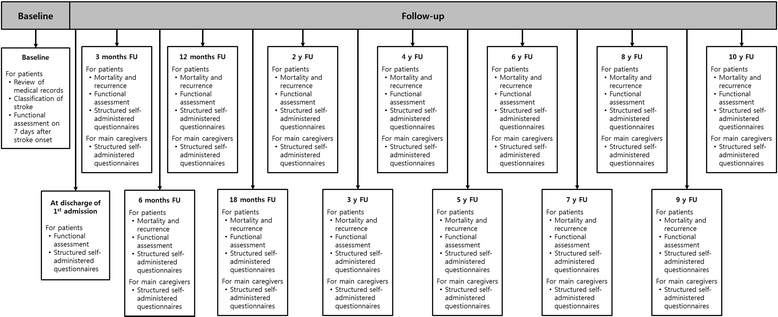Korean Stroke Cohort for functioning and rehabilitation (KOSCO): study rationale and protocol of a multi-centre prospective cohort study
- PMID: 25886039
- PMCID: PMC4376073
- DOI: 10.1186/s12883-015-0293-5
Korean Stroke Cohort for functioning and rehabilitation (KOSCO): study rationale and protocol of a multi-centre prospective cohort study
Abstract
Background: Development of a long-term stroke care plan requires serial assessment of long-term patient function and consideration of caregiver mood. However, to date, few comprehensive cohort studies have included both stroke patients and caregivers.
Methods/design: KOSCO is a large, multi-centre prospective cohort study for all acute first-ever stroke patients admitted to participating hospitals in nine distinct areas of Korea. This study is designed as a 10-year, longitudinal follow-up investigating the residual disabilities, activity limitations, and quality of life issues arising in patients suffering from first-ever stroke. The main objectives of this study are to identify the factors that influence residual disability and long-term quality of life. The secondary objectives of this study are to determine the risk of mortality and recurrent vascular events in patients with acute first-ever stroke. We will investigate longitudinal health behaviors and patterns of healthcare utilization, including stroke rehabilitation care. We will also investigate the long-term health status, mood, and quality of life in stroke patient caregivers. In addition, we will identify baseline and ongoing characteristics that are associated with our secondary outcomes.
Discussion: KOSCO is a prospective, multi-centre, 10-year longitudinal follow-up study investigating the residual disabilities, activity limitations, and quality of life issues arising in patients suffering from first-ever stroke.
References
-
- Slot KB, Berge E, Dorman P, Lewis S, Dennis M, Sandercock P, et al. Impact of functional status at six months on long term survival in patients with ischaemic stroke: prospective cohort studies. BMJ. 2008;336:376–379. doi: 10.1136/bmj.39456.688333.BE. - DOI - PMC - PubMed
Publication types
MeSH terms
LinkOut - more resources
Full Text Sources
Other Literature Sources
Medical


